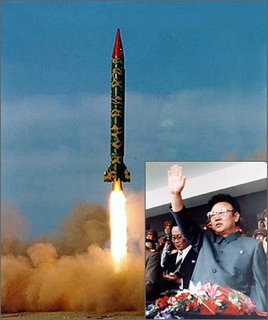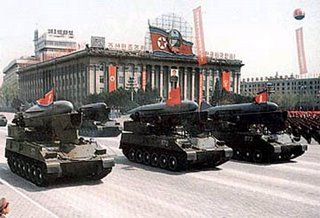North Korea’s Missiles Find Fewer Buyers
The missile market is not what it used to be for North Korea, with fewer buyers for a key export product and a loss in prestige when its top-end rocket fizzled after a short test flight, US officials and experts said. US pressure on customers appears to have cut into sales. The UN has called on countries to avoid supporting Pyongyang’s missile programme, but the North persists because missile sales earn it hundreds of millions of dollars. "The buyers are drying up," said Daniel Pinkston, a proliferation expert with the California-based Centre for Non-proliferation Studies (CNS). Mitchell Reiss, a former senior State Department official who dealt closely with North Korea and now is vice provost at the College of William and Mary in Virginia, said: "Our efforts have complicated North Korea’s missile export business." Bush administration officials make similar claims, although details have not been spelled out. Their strategy includes a crackdown on banks Washington suspects of aiding the North in illicit activities and a proliferation security initiative in which 66 member nations share intelligence and practise interdicting weapons shipments. US Defence Secretary Donald Rumsfeld said North Korea , which claims itself to be a nuclear weapons power, is more dangerous as a proliferator than as a military threat to neighbour South Korea. "They will sell anything to anyone," Rumsfeld said while visiting missile defence installations in Alaska a week ago, adding: "There’s not much they have that they wouldn’t sell either to another country or possibly to a terrorist network." Proliferation experts agree the impoverished North is always seeking ways, at times illicit, to earn hard cash. A 2004 US government study reported the North earned $560mn from missile sales in 2001. Pyongyang has been working on missile production for three decades and is "the leading exporter of ballistic missiles to the developing world," according to a book by the Carnegie Endowment for International Peace. The chief exports are variations of Scud missiles, regarded as fairly reliable and accurate but based on technology advanced military powers would consider obsolete.
Their strategy includes a crackdown on banks Washington suspects of aiding the North in illicit activities and a proliferation security initiative in which 66 member nations share intelligence and practise interdicting weapons shipments. US Defence Secretary Donald Rumsfeld said North Korea , which claims itself to be a nuclear weapons power, is more dangerous as a proliferator than as a military threat to neighbour South Korea. "They will sell anything to anyone," Rumsfeld said while visiting missile defence installations in Alaska a week ago, adding: "There’s not much they have that they wouldn’t sell either to another country or possibly to a terrorist network." Proliferation experts agree the impoverished North is always seeking ways, at times illicit, to earn hard cash. A 2004 US government study reported the North earned $560mn from missile sales in 2001. Pyongyang has been working on missile production for three decades and is "the leading exporter of ballistic missiles to the developing world," according to a book by the Carnegie Endowment for International Peace. The chief exports are variations of Scud missiles, regarded as fairly reliable and accurate but based on technology advanced military powers would consider obsolete. North Korea’s oldest and most loyal customer has been Iran, which helped finance Scud development, according to various US studies. The connection dates to the Iran-Iraq war of the 1980s when Pyongyang tested and began shipping missiles to Tehran. North Korea, as well as China, provided ballistic missiles, cruise missiles and their production facilities to Iran, Iraq, Syria and Egypt, US government reports say. Libya and Pakistan have also been missile customers. But potential buyer nations now may find their US aid curtailed if they buy weapons from North Korea. Pakistan, Iraq and Egypt are major recipients of US assistance. North Korea defied international warnings and test-fired seven missiles on July 5, including its long-range Taepodong-2 missile which blew up less than a minute in the air. The failure was not good for the North’s missile export business, experts said. Yonhap news reported on Sunday the North may be readying for another test. Pinkston said the North has been trying to skirt restrictive measures by selling missile components, technology and equipment, which are harder to trace than finished products. Shipments are made by air instead of sea, giving spy satellites less time to follow the cargo. North Korea has more than 1,000 missiles of various ranges and is at the centre of ballistic missile proliferation, South Korea’s Institute of Foreign Affairs and National Security (IFANS) said in a report last month. "The development of the Taepodong-2 is conducted jointly with Iran, and it is possible China’s technology is used in the development of the Taepodong-2 engine," it said.
North Korea’s oldest and most loyal customer has been Iran, which helped finance Scud development, according to various US studies. The connection dates to the Iran-Iraq war of the 1980s when Pyongyang tested and began shipping missiles to Tehran. North Korea, as well as China, provided ballistic missiles, cruise missiles and their production facilities to Iran, Iraq, Syria and Egypt, US government reports say. Libya and Pakistan have also been missile customers. But potential buyer nations now may find their US aid curtailed if they buy weapons from North Korea. Pakistan, Iraq and Egypt are major recipients of US assistance. North Korea defied international warnings and test-fired seven missiles on July 5, including its long-range Taepodong-2 missile which blew up less than a minute in the air. The failure was not good for the North’s missile export business, experts said. Yonhap news reported on Sunday the North may be readying for another test. Pinkston said the North has been trying to skirt restrictive measures by selling missile components, technology and equipment, which are harder to trace than finished products. Shipments are made by air instead of sea, giving spy satellites less time to follow the cargo. North Korea has more than 1,000 missiles of various ranges and is at the centre of ballistic missile proliferation, South Korea’s Institute of Foreign Affairs and National Security (IFANS) said in a report last month. "The development of the Taepodong-2 is conducted jointly with Iran, and it is possible China’s technology is used in the development of the Taepodong-2 engine," it said.
 Their strategy includes a crackdown on banks Washington suspects of aiding the North in illicit activities and a proliferation security initiative in which 66 member nations share intelligence and practise interdicting weapons shipments. US Defence Secretary Donald Rumsfeld said North Korea , which claims itself to be a nuclear weapons power, is more dangerous as a proliferator than as a military threat to neighbour South Korea. "They will sell anything to anyone," Rumsfeld said while visiting missile defence installations in Alaska a week ago, adding: "There’s not much they have that they wouldn’t sell either to another country or possibly to a terrorist network." Proliferation experts agree the impoverished North is always seeking ways, at times illicit, to earn hard cash. A 2004 US government study reported the North earned $560mn from missile sales in 2001. Pyongyang has been working on missile production for three decades and is "the leading exporter of ballistic missiles to the developing world," according to a book by the Carnegie Endowment for International Peace. The chief exports are variations of Scud missiles, regarded as fairly reliable and accurate but based on technology advanced military powers would consider obsolete.
Their strategy includes a crackdown on banks Washington suspects of aiding the North in illicit activities and a proliferation security initiative in which 66 member nations share intelligence and practise interdicting weapons shipments. US Defence Secretary Donald Rumsfeld said North Korea , which claims itself to be a nuclear weapons power, is more dangerous as a proliferator than as a military threat to neighbour South Korea. "They will sell anything to anyone," Rumsfeld said while visiting missile defence installations in Alaska a week ago, adding: "There’s not much they have that they wouldn’t sell either to another country or possibly to a terrorist network." Proliferation experts agree the impoverished North is always seeking ways, at times illicit, to earn hard cash. A 2004 US government study reported the North earned $560mn from missile sales in 2001. Pyongyang has been working on missile production for three decades and is "the leading exporter of ballistic missiles to the developing world," according to a book by the Carnegie Endowment for International Peace. The chief exports are variations of Scud missiles, regarded as fairly reliable and accurate but based on technology advanced military powers would consider obsolete. North Korea’s oldest and most loyal customer has been Iran, which helped finance Scud development, according to various US studies. The connection dates to the Iran-Iraq war of the 1980s when Pyongyang tested and began shipping missiles to Tehran. North Korea, as well as China, provided ballistic missiles, cruise missiles and their production facilities to Iran, Iraq, Syria and Egypt, US government reports say. Libya and Pakistan have also been missile customers. But potential buyer nations now may find their US aid curtailed if they buy weapons from North Korea. Pakistan, Iraq and Egypt are major recipients of US assistance. North Korea defied international warnings and test-fired seven missiles on July 5, including its long-range Taepodong-2 missile which blew up less than a minute in the air. The failure was not good for the North’s missile export business, experts said. Yonhap news reported on Sunday the North may be readying for another test. Pinkston said the North has been trying to skirt restrictive measures by selling missile components, technology and equipment, which are harder to trace than finished products. Shipments are made by air instead of sea, giving spy satellites less time to follow the cargo. North Korea has more than 1,000 missiles of various ranges and is at the centre of ballistic missile proliferation, South Korea’s Institute of Foreign Affairs and National Security (IFANS) said in a report last month. "The development of the Taepodong-2 is conducted jointly with Iran, and it is possible China’s technology is used in the development of the Taepodong-2 engine," it said.
North Korea’s oldest and most loyal customer has been Iran, which helped finance Scud development, according to various US studies. The connection dates to the Iran-Iraq war of the 1980s when Pyongyang tested and began shipping missiles to Tehran. North Korea, as well as China, provided ballistic missiles, cruise missiles and their production facilities to Iran, Iraq, Syria and Egypt, US government reports say. Libya and Pakistan have also been missile customers. But potential buyer nations now may find their US aid curtailed if they buy weapons from North Korea. Pakistan, Iraq and Egypt are major recipients of US assistance. North Korea defied international warnings and test-fired seven missiles on July 5, including its long-range Taepodong-2 missile which blew up less than a minute in the air. The failure was not good for the North’s missile export business, experts said. Yonhap news reported on Sunday the North may be readying for another test. Pinkston said the North has been trying to skirt restrictive measures by selling missile components, technology and equipment, which are harder to trace than finished products. Shipments are made by air instead of sea, giving spy satellites less time to follow the cargo. North Korea has more than 1,000 missiles of various ranges and is at the centre of ballistic missile proliferation, South Korea’s Institute of Foreign Affairs and National Security (IFANS) said in a report last month. "The development of the Taepodong-2 is conducted jointly with Iran, and it is possible China’s technology is used in the development of the Taepodong-2 engine," it said.
































<< Home